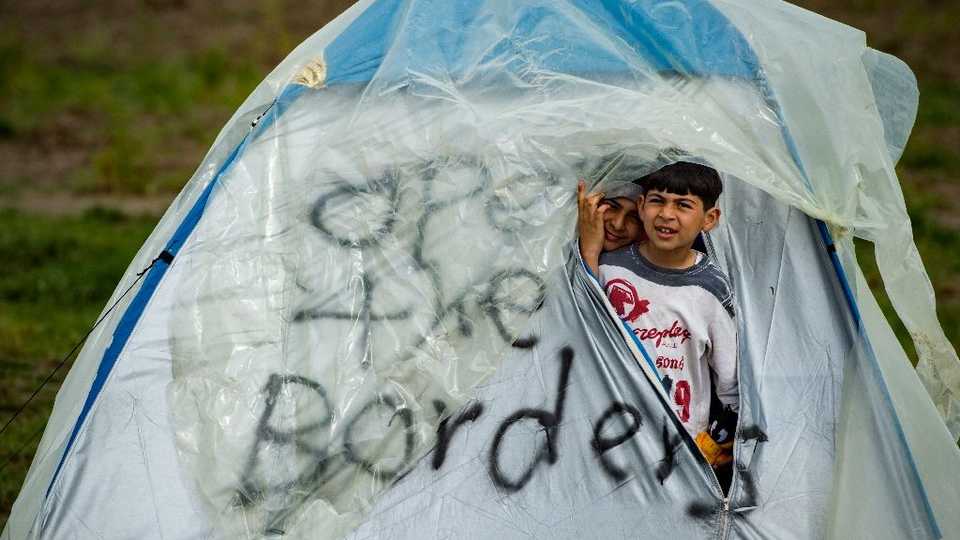
Europe witnessed the biggest refugee flow in 2015 after World World II – mostly coming through the Aegean Sea in an effort to seek the safety they had lost in their homelands.
More than a million people arrived in Europe only in the second half of 2015, according to data from the UN Refugee Agency (UNHCR).
The massive flow of migrants rocked EU states, predominantly Germany, and violent anti-refugee protests took place and many refugee centers also came under arson attacks.
Turkey is a transit point for refugees and asylum seekers aiming to reach Europe because of its geographical location that bridges the war-torn Middle East and Europe. Therefore, the EU had to work in coordination with Turkey.
The first concrete agreement between Turkey and the EU dates back to late 2013 when the two parties signed two deals simultaneously.
One is the Readmission Agreement, which allows European countries to send back refugees that came via Turkey, the other one is a visa-free travel agreement for Turkish citizens, which was Ankara’s condition for the readmission deal.
For visa-free travel within the EU, all countries have to pass certain criteria. Ankara agreed to fulfill a portion of the lacking 72 criteria to complete visa-free travel, including an anti-terror law, which would later become an issue between the parties.
However, at the end of 2015, the massive refugee flow forced the EU to accelerate the steps to implement the relocation deal.
And in March 2016, as the two parties were still working on the implementation of the 2013 agreements, the EU and Turkey signed another deal on a plan to immediately stop the flow.
The 2016 March deal
Turkey’s then-prime minister Ahmet Davutoglu and leaders of the EU inked a deal on March 2016 in Brussels to speed up the process to stop the refugee flow.
Under the pact, Turkey would accept some vetted refugees who cross the Aegean Sea illegally to reach the Greek islands, and send the same number of refugees to European countries. Also the European Union would provide the country with more financial aid, immediate visa-free travel and progress in its EU membership negotiations.
However, visa-free access to the EU has been subject to delays due to a dispute over an amendment on the anti-terror law that Turkey had pledged to comply to in the 2013 deal.
Only one-and-a-half years after the 2013 agreement, Turkey has witnessed several terror attacks across the country by PKK, Daesh, and also Fetullah Terror Organisation, or FETO, killing hundreds of people.
Turkey ruled out any change on its anti-terror law as the country’s struggle against terror became more pronounced.
Turkish officials underlined any softening on the stance in the fight against terror would also endanger European countries’ security since Turkey stands as a border between Europe and war-torn Syria and Iraq.
Hence, little progress has been made on the agreement to give Turkish nationals access to the Schengen passport-free zone, and it has never been applied, despite the refugee deal being in force.
Drop in refugee influx
Turkey stepped up coast guard missions in the Aegean with stricter measures that helped trigger a massive drop in the influx of refugees.
The EU’s border agency Frontex, in a 2016 report, said Europe witnessed a sharp drop in the number of refugees arriving from Turkey.
Germany and Sweden saw the biggest drop in arriving refugees as they had previously followed an open-door policy towards refugees.
The German interior ministry highlighted that the dramatic drop in the influx was thanks to the deal between the EU and Turkey, that was in fact brokered by Germany.
Around 280,000 asylum seekers arrived in Germany in 2016, a drop of more than one million compared to the previous year.
Turkey also took back refugees who arrived in Greece from Turkish territories.
€6 billion and visa-free travel
The EU has agreed on a €3+3 billion aid package given to Turkey to improve conditions for the refugees the country is hosting.
Turkey is the top Syrian refugee host in the world sheltering more than 3 million Syrian refugees, according to UNHCR.
Turkish President Recep Tayyip Erdogan said his country has spent over $30 billion on Syrian refugees since the war started in 2011.
However, he said that the EU fell far short of the pledged €6 billion, with only €885 million disbursed to date.

Accession talks
Turkey’s formal accession talks to the European Union started in 2005. Since then, the process has continued with ups and downs. During the refugee deal talks, it experienced the biggest rise in history. Turkish PM was invited to the EU summits in Brussels, for the first time since 2005.
As a candidate country, Turkey has to successfully conclude negotiations with the EU in 35 chapters in various policy areas, which involve reforms and adaptation of European standards for its EU membership.
Since then, Turkey has started the negotiations on 16 chapters. Two of them started during the refugee deal talks, in an attempt to accelerate talks by the EU. But it has been more than a year since the last chapter was opened on June 2016.
The visa-liberalisation process stopped due to the problems with the amendment on anti-terror law. And Turkey’s EU accession talks have dramatically lost their momentum.










Discussion about this post